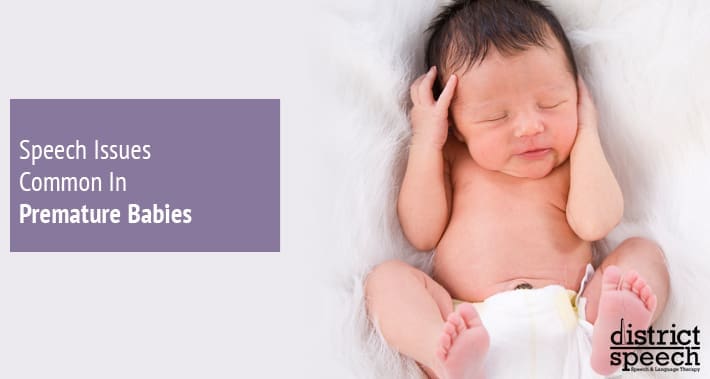
Do you’ve a child who was born before 37 weeks of pregnancy or premature?
You’re not alone.
In the US alone, statistics on premature birth show that about 1 in every 10 babies was born premature in 2022.
Premature birth can cause a variety of speech issues, and other health complications.
Are you worried that your premature baby may be developing one of the common issues of speech?
Are you worried they’re falling behind, and not meeting their speech developmental milestones?
Or, is your toddler now showing the top signs of a speech disorder?
Spotting signs of a speech or language disorder early is vital to minimizing the development of other issues.
At District Speech, we offer speech therapy for kids of all ages.
This can help your child overcome these issues during their vital stages of development.
In particular, early intervention therapy can be an especially effective tool.
It may help ensure your child gets the attention and guidance needed as they grow.
Today, we’ll take a closer look at some of the speech issues common in premature babies.
We will also see how our speech pathologists in Washington DC can help.
What Is A Premature Baby?
A premature baby (also known as a preterm baby) is one born before 37 weeks of pregnancy.
The earlier the baby is born, the higher the risks can be.
If your baby was born earlier than 33 weeks or had a birth weight of under 3 lbs 5 oz, the risks for disability and developmental concerns increase even more.
This is because your baby needs the final weeks of pregnancy for their brain, liver, and lungs to develop fully.
When these areas of the body are not fully developed at birth, it can be problematic.
Issues involving speech and other health issues may arise.
Some health complications of premature birth can include:
- Breathing issues
- Feeding and swallowing disorders
- Celebral palsy
- Epilepsy
All of these issues can impact your child’s speech development.
Long term problems for your preterm baby may involve hitting developmental milestones later than usual.
Some of these developmental milestones include speech.
This is why speech therapy for premature babies is so important.
What Causes A Premature Baby?
All of the factors that contribute to premature births aren’t known.
But, there are some risk factors you should be aware of.
Pregnancy complications, short periods of time between pregnancies, and being pregnant with multiples are all considered risk factors.
Substance and tobacco use are both also significant risks that can lead to premature birth.
However, it’s important to know that you can have a premature birth even with no risk factors.
There is help for you if you gave or do give birth to a preterm baby.
Signs Your Premature Baby Has A Speech Or Language Disorder
There are many different types of speech disorders in the US.
This means that each speech and language disorder may have slightly different warning signs.
But, some of the warning signs for speech disorders overlap.
One of the things to look out for in your premature baby is if they’re developing a speech or language disorder.
So, what are some of the href=”https://districtspeech.com/top-signs-your-child-has-a-speech-disorder/”>signs your child has a speech disorder?
Keep track of the major speech milestones for your child’s age group, and make sure to add a few months to account for your baby being premature.
A child’s first words are usually said by their first birthday, and by two they can usually construct two word sentences.
While all children develop differently, you may be worried your child isn’t hitting the usual milestone.
Is your child is displaying some red flags for language and speech development?
If so, it’s great to get a speech therapist involved early on
Below are some of the signs your baby may have a speech or language disorder.

1. Hearing Loss
Sometimes, a lack of speech may be a sign that your baby isn’t hearing well.
This might be something simple, like ear wax buildup.
Hearing loss is important to catch early on so your baby doesn’t fall behind.
This is because, hearing loss can affect your child’s speech development.
If your child has these hearing issues, a hearing loss speech therapist can help.
Hearing loss speech therapy helps with learning language, understanding sentences, and with school social skills and performance.
2. Speech That’s Difficult To Understand
Are you having trouble understanding your child?
Your child may have trouble expressing themself, especially when trying to communicate an opinion or tell a story.
Sometimes when this happens, your child may even get so frustrated they stop trying to talk with you.
Sound production can also be an issue in premature babies.
Your baby may have trouble making certain sounds.
This can make speech harder to understand.
It’s worth noting that distorted speech can be a sign of speech disorders, including:
- Childhood apraxia of speech
- Articulation disorders
- Orofacial myofunctional disorders
- Dysarthria
- And others
In many of these disorders, important aspects of your speech are distorted.
RELATED: The Parts of Speech: Articulation
3. A Small Vocabulary
A child’s vocabulary consists of all the words they use to communicate with us and others.
Studies of vocabulary show that the number of words within your child’s vocabulary will differ based on your child’s age.
For example, the average preschool child will know between 1000 and 10000 words.
You may feel like your child isn’t speaking as many words as other children their age.
For premature babies, this can very well be the case.
It’s good to get an idea of how many words your child should know at their age when born preterm.
A speech therapist could help you determine this even at an early stage of development.
You can work along with your child’s speech therapist to help your child build their vocabulary.
4. Not Meeting Developmental Milestones
We mentioned before that it’s a good idea to keep an eye on the developmental milestones for your child’s age group.
While every child is different, here are some age related milestones you can keep an eye on for your premature baby:
- Four months – starts babbling
- Twelve months – may say at least one word
- Eighteen months – vocabulary of 10-20 words
- Two years – can form short sentences
Delays are to be expected with your premature baby.
But, monitoring these developmental milestones can help you make a decision about getting intervention for your child where needed.
This intervention can help to provide treatment for current issues.
It can also work on the prevention of other issues that may arise if these issues are not treated.
The Importance Of Early Intervention
Early intervention can be critical in making sure your premature baby gets the help they need.
As your baby’s brain develops, they’re forming new neural pathways, especially before the age of three.
This may make it easier to learn and correct speech at a younger age, than when they’re older.
With early intervention, the effects of the issues your premature baby may be encountering can be lessened.
The younger your child is, the easier it will be for them to adapt to the use of new speech techniques.
Early intervention speech therapy can be a critical tool.
It helps your premature baby reach their developmental milestones.
Book Your Appointment With District Speech Today
Are you worried that your premature baby is struggling with their language and speech?
Here at District Speech, our speech therapists can help you tackle these issues head on, so you don’t have to worry.
We provide speech therapy virtually to our clients as well as in person.
Book your appointment with District Speech today.
1300 I St NW, Suite 400 E,
Washington, DC 20005
- https://g.page/districtspeech
District Speech and Language Therapy specializes in speech therapy, physical therapy, and occupational therapy solutions, for both children and adults, in the Washington D.C and the Arlington Virginia areas.